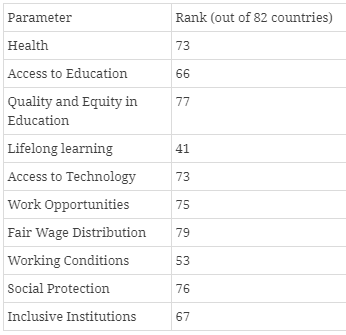Social Justice
Global Social Mobility Index: WEF
- 21 Jan 2020
- 5 min read
Why in News
The World Economic Forum (WEF) has come out with its first-ever Global Social Mobility Report.
- The Social Mobility Report showed that across the Global Social Mobility Index, only a handful of nations have put in place the right conditions to promote social mobility.
Social Mobility
- Absolute social mobility is the ability of a child to experience a better life than their parents.
- While, relative social mobility is an assessment of the impact of socio-economic background on an individual’s outcomes in life.
- It needs to be noted that the concept of social mobility is much broader than just looking at income inequality. E.g.
- In economies such as China and India, economic growth can lift entire populations upward in terms of absolute income, but an individual’s status in society relative to others remains the same.
Global Social Mobility Index
- The WEF’s Global Social Mobility Index assesses the 82 economies on “10 pillars” spread across the following five key dimensions of social mobility:
- Health;
- Education (access, quality and equity, lifelong learning);
- Technology;
- Work (opportunities, wages, conditions);
- Protection and Institutions (social protection and inclusive institutions).
- Top Performers: The Nordic nations hold the top five spots, led by Denmark in the first place (scoring 85 points), followed by Norway, Finland and Sweden (83 points) and Iceland (82 points).
- Among the G7 economies, Germany is the most socially mobile - ranking 11th, followed by France in 12th position.
- Among BRICS grouping, the Russian Federation is the most socially mobile (39th), followed by China (45th), Brazil (60th), India (76th) and South Africa (77th).
India’s Performance
- India’s overall ranking is a poor - 76 out of the 82 countries considered.
- However, India is among the five countries that stand to gain the most from a better social mobility score.
Findings from the Report
- Economies that would gain the most from increases in social mobility: China followed by US, India, Japan, Germany and Russia.
- Increasing social mobility by 10% would benefit social cohesion and boost the world’s economies by nearly 5% by 2030.
- The report also makes a powerful case for stakeholder capitalism. By comparison, economies that are organized more on “shareholder value maximization”, or “state capitalism”, tend to perform less well.
Note
- Stakeholder capitalism is a system in which corporations are oriented to serve the interests of all their stakeholders. Under this system, a company's purpose is to create long-term value and not to maximize profits and enhance shareholder value at the cost of other stakeholder groups.
- State Capitalism is an economic system in which private capitalism is modified by a varying degree of government ownership and control.
- It calls for a new financing model for social mobility:
- Improving tax progressivity on personal income, policies that address wealth concentration and broadly rebalancing the sources of taxation can support the social mobility agenda.
- Most importantly, the mix of public spending and policy incentives must change to put greater emphasis on the factors of social spending.
World Economic Forum
- The World Economic Forum is the International Organization for Public-Private Cooperation.
- It was established in 1971 as a not-for-profit foundation and is headquartered in Geneva, Switzerland. It is independent, impartial and not tied to any special interests.
- The Forum strives in all its efforts to demonstrate entrepreneurship in the global public interest while upholding the highest standards of governance.
- Other Important Reports of WEF:






